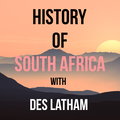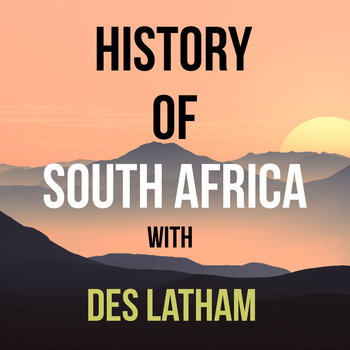
Episode 154 - The Swellekamp grifter and Captain Smith marches from the Umgazi River to Port Natal
Loading player...
This is episode 154 and the amaBhaca people under chief Ncapayi have just raided the Boers along the upper Bushman’s river and near their new town of Weenen.
Joining the Bhaca were the San raiders you heard about in episode 152. The area around the Umzimvubu River had been unstable ever since the amaBhaca fled to the region during Shaka’s time, and the amaBhaca now lived west of the amaPondo who were ruled by chief Faku ka Ngqungqushe. It’s important to note that both the amaMpondo and the amaBhaca used to live further north in Natal before Shaka’s fractious wars began and led to the movement of the people known as the Mfecane.
The amaPondo did not trust the amaBhaca, calling them thieves. The arrival of the Boers in Natal meant they had a powerful new possible ally — but they quickly learned that the Boers were not to be trusted either as you’re going to hear in this episode.
Faku regularly communicated with the Voortrekkers, and now that the amaBhaca had made the fatal decision to steal more than 700 head of cattle from the trekkers near Weenen, along with 50 horses, the Volksraad in Pietermaritzburg had had enough.
They met in November and ordered Andries Pretorius and commandant Hendrik Stephanus Lombard to lead a commando of 260 Boers to extract maximum revenge from the amaBhaca. Chief Fodo of the Nlangwini who lived between the Bhaca and the Boers had also been raided, so he and about a hundred of the Nlangwini warriors joined the Boer commando seeking their own form of restitution.
In the ensuing attack, 26 men, ten women and four children were killed, and the boers seized 3 000 cattle as well as 2 000 sheep. The numbers have been contested over the years, but the fact that women and children died was confirmed.
However, it was their decision to seize at least 17 of the amaBhaca children they said had been orphaned in the attack that was going to lead to a great deal of interest by the anti-slavery lobby in the Cape — and in England.
Chief Faku wrote a letter around this time to Governor Sir George Napier, expressing his fear that he would be next, that the Boers were seizing livestock and children willy nilly south of the Umzimvubu River, and that matters could not continue and begged to be placed under the protection of the British Government.
on August 2nd 1841, the Raad took the rather unwise decision to force all these amaZulu squatters off the farms. It went further, ruling that none had any right to claim any part of Natal at all.
They should be removed, resolved the Volksraad, to the tract of land between the Umtamvuna River and the Umzimvubu River. ON the surface, this appeared to be a reasonable suggestion, the land is excellent here, enough water and good soils. However, no-one had bothered to ask the local African clans what they thought of this basically, forced removal and furthermore, someone already lived there.
On August 21st, Lord John Russell instructed the Governor to make arrangements for the reoccupying of Port Natal.
This is where Captain Smith would make his appearance and the coming march overland to Port Natal was going to be arduous indeed.
Joining the Bhaca were the San raiders you heard about in episode 152. The area around the Umzimvubu River had been unstable ever since the amaBhaca fled to the region during Shaka’s time, and the amaBhaca now lived west of the amaPondo who were ruled by chief Faku ka Ngqungqushe. It’s important to note that both the amaMpondo and the amaBhaca used to live further north in Natal before Shaka’s fractious wars began and led to the movement of the people known as the Mfecane.
The amaPondo did not trust the amaBhaca, calling them thieves. The arrival of the Boers in Natal meant they had a powerful new possible ally — but they quickly learned that the Boers were not to be trusted either as you’re going to hear in this episode.
Faku regularly communicated with the Voortrekkers, and now that the amaBhaca had made the fatal decision to steal more than 700 head of cattle from the trekkers near Weenen, along with 50 horses, the Volksraad in Pietermaritzburg had had enough.
They met in November and ordered Andries Pretorius and commandant Hendrik Stephanus Lombard to lead a commando of 260 Boers to extract maximum revenge from the amaBhaca. Chief Fodo of the Nlangwini who lived between the Bhaca and the Boers had also been raided, so he and about a hundred of the Nlangwini warriors joined the Boer commando seeking their own form of restitution.
In the ensuing attack, 26 men, ten women and four children were killed, and the boers seized 3 000 cattle as well as 2 000 sheep. The numbers have been contested over the years, but the fact that women and children died was confirmed.
However, it was their decision to seize at least 17 of the amaBhaca children they said had been orphaned in the attack that was going to lead to a great deal of interest by the anti-slavery lobby in the Cape — and in England.
Chief Faku wrote a letter around this time to Governor Sir George Napier, expressing his fear that he would be next, that the Boers were seizing livestock and children willy nilly south of the Umzimvubu River, and that matters could not continue and begged to be placed under the protection of the British Government.
on August 2nd 1841, the Raad took the rather unwise decision to force all these amaZulu squatters off the farms. It went further, ruling that none had any right to claim any part of Natal at all.
They should be removed, resolved the Volksraad, to the tract of land between the Umtamvuna River and the Umzimvubu River. ON the surface, this appeared to be a reasonable suggestion, the land is excellent here, enough water and good soils. However, no-one had bothered to ask the local African clans what they thought of this basically, forced removal and furthermore, someone already lived there.
On August 21st, Lord John Russell instructed the Governor to make arrangements for the reoccupying of Port Natal.
This is where Captain Smith would make his appearance and the coming march overland to Port Natal was going to be arduous indeed.

